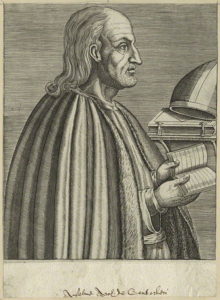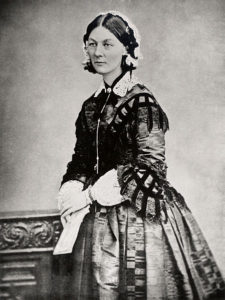Today in Lent Madness, we will finally answer that age old question: Theologian or Nurse? Okay, there's a lot more to Anselm of Canterbury and Florence Nightingale than these two labels, so you'll just have to read on.
In yesterday's action, Henry Budd left Cecilia singing the blues as the patron saint of music lost in a close battle 53% to 47%.
Shockingly (or not so shockingly if you're a longtime Lent Madness participant), we encountered our first case of voter fraud as 546 votes for Cecilia were removed after the ever-vigilant SEC noticed a discrepancy. It was a youthful prank and said youth has since confessed and been absolved. Frankly, there are worse ways for teens to get into trouble on the internet than voting too many times for a saint in Lent Madness.
However, this will not be tolerated and perpetrators face being cast into the outer darkness of Lent Madness where there will be weeping and gnashing of brackets. Do everyone a favor: vote once. If you're particularly enthusiastic, get all your friends, neighbors, and even your enemies (the ones we're supposed to love anyway) to cast a vote for your favorite saint. Big Lent is watching...
Anselm of Canterbury
 Anselm of Canterbury was a Benedictine monk and theologian of the medieval Church. Born in the eleventh century in a region of France that is now part of Italy, he entered the Abbey of Bec as a novice at the age of 27. Later, he became abbot and was known for his skillful leadership and his kind, loving discipline toward the monks. He was also known for his very public squabbles with the monarchs of England during his time as the Archbishop of Canterbury, defending the Church’s authority to appoint leaders and manage its own wealth. For his resistance to the English kings, he was exiled twice.
Anselm of Canterbury was a Benedictine monk and theologian of the medieval Church. Born in the eleventh century in a region of France that is now part of Italy, he entered the Abbey of Bec as a novice at the age of 27. Later, he became abbot and was known for his skillful leadership and his kind, loving discipline toward the monks. He was also known for his very public squabbles with the monarchs of England during his time as the Archbishop of Canterbury, defending the Church’s authority to appoint leaders and manage its own wealth. For his resistance to the English kings, he was exiled twice.
Marrying his Neoplatonic worldview with Aristotelian logic, Anselm is considered one of the greatest thinkers of the Middle Ages. He espoused a philosophy of “faith seeking understanding,” by which he meant people’s love of God inspired them to pursue deeper knowledge of God. Anselm is especially known for two highly influential theological arguments. The first argument—Proslogion—explores the existence of God. Secondly, his treatise Cur Deus Homo irrevocably shaped the development of Christian theology by arguing that Jesus’ crucifixion was necessary to atone for humankind’s sin. Anselm argues that through sin, humans offended God, and God is owed restitution for this offense—but we have nothing with which to make such a payment. Personal acts of atonement will not suffice. Only God can pay off such massive, crushing debt. As God is merciful, atonement is made with the self-sacrifice of the sinless, human, and divine figure of Jesus. Anselm’s theory was criticized by his contemporaries and continues to trouble some theologians, even as it has formed the backbone of much of Christian
theology for a millennium.
Anselm died in 1109 on Spy Wednesday (the Wednesday in Holy Week) and was laid to rest at Canterbury Cathedral. The exact location of his relics today is uncertain—they were removed after a cataclysmic fire in the 1170s. Anselm’s feast day is April 21.
Collect for Anselm of Canterbury
Almighty God, you raised up your servant Anselm to teach the Church of his day to understand its faith in your eternal Being, perfect justice, and saving mercy: Provide your Church in every age with devout and learned scholars and teachers, that we may be able to give a reason for the hope that is in us; through Jesus Christ our Lord, who lives and reigns with you and the Holy Spirit, one God, for ever and ever. Amen.
Florence Nightingale
 Known as “The Lady with the Lamp” for her work as a nurse during the Crimean War, Florence Nightingale was born in Florence, Italy, in 1820 to a well-connected British family. Despite her upper-class background, Nightingale heard a call from God in 1837 to serve and care for others. Nightingale was expected to marry well, produce children, and carry on the family legacy. Instead, she boldly answered the call she heard from God and became the founder of modern nursing practice.
Known as “The Lady with the Lamp” for her work as a nurse during the Crimean War, Florence Nightingale was born in Florence, Italy, in 1820 to a well-connected British family. Despite her upper-class background, Nightingale heard a call from God in 1837 to serve and care for others. Nightingale was expected to marry well, produce children, and carry on the family legacy. Instead, she boldly answered the call she heard from God and became the founder of modern nursing practice.
Born out of her experiences of tending the wounded during the Crimean War, Nightingale began documenting the effects of sanitary conditions on wartime injuries. Nightingale is said to have reduced the mortality rate during the war from 42 percent to 2 percent by addressing hand washing, water contamination, and sterilization of surgical materials. These ideals of sanitary care continue to this day in modern healthcare practice.
Nightingale documented her theories on nursing care in numerous publications—the most famous is her treatise, Notes on Nursing. These theories led her to establish the Nightingale School for Nurses at St. Thomas’s Hospital in London (now part of King’s College, London). This began a process of social reform that opened the door for women, providing them with skills that led to careers outside of domestic service work or factory positions. By providing a skilled nursing force, Nightingale improved healthcare disparities in London and implemented workforce healthcare (now occupational and public health nursing practice); she also advocated for hunger relief in India and worked to abolish prostitution laws that targeted women.
Nightingale was raised in the Church of England and was greatly influenced by Wesleyan ideals. Nightingale believed that her faith was best expressed through the care and love of others. A believer in universal reconciliation, Nightingale is said to have comforted one prostitute who was concerned about going to hell. Nightingale said, “Oh, my girl, are you not now more merciful than the God you think you are going to? Yet the real God is far more merciful than any human creature ever was or can ever imagine.”
Collect for Florence Nightingale
Life-giving God, you alone have power over life and death, over health and sickness: Give power, wisdom, and gentleness to those who follow the lead of your servant Florence Nightingale, that they, bearing with them your presence, may not only heal but bless, and shine as lanterns of hope in the darkest hours of pain and fear; through Jesus Christ, the healer of body and soul, who lives and reigns with you and the Holy Spirit, one God, now and for ever. Amen.
[poll id="177"]
337 comments on “Anselm of Canterbury vs. Florence Nightingale”
For most of my life I've had problems with the Penal Substitution Theory of Atonement, to which Anselm made a substantial contribution. Florence wins my vote for her more thansubstantial contribution to healing.
I'm with you, Elaine. How could I pass up the chance to vote against Penal Substitution Theory?! 😉
I voted for Flo.. I am biased toward love in action. I appreciate all the comments in general but especially those on Anselm. I had a negative reaction to him at first but from the comments have more appreciation now .. especially for faith seeking understanding. After all it is this love I feel for God that keeps me moving forward and seeking an understanding I can live with.
As a retired hospital and hospice chaplain, and firm believer in God's mercy, I had to cast my vote for Florence Nightingale.
As I vote, i wish i could actually meet these saints.
I believe one day we all will at the great feast & eternal party that is called Heaven.
Lent Maddness is my number uno! So much so it's not posted early enough. The wonderful story's of people I'm learning about is very intriguing. I have voted for every person that has won. So, now I will read the people posted in the a.m. and think about it through the day. That evening, I'll reread and vote. Just to see if I may change my mind.
Anselm was defiantly a genius. His philosophy was incouraging. Although I looked up words in this artical I still enjoyed it. He also defended his church!
Florence loved God, took care of people, taught skills of cleanliness, cared for and prayed with a prostitute.
My mom and step mom are nurses. (You got my vote ) AND OLIVER, I agree!
Look forward to tomorrow!
I found St. Anselm most interesting, but I had to vote for Florence because I spent three years at Florence Nightingale Junior High School in my youth.
I am deeply offended at Cecilia's bumping - "unfair!" And on the eve of International Women's Day, no loss.
My mom was a nurse - I now tao Forence Nightingale the Next "Golden Hali" recipient.
I'm with Florence Nightingale because she helped the sick and is a girl. not many girls are noted.
It isn't "either... or" in my opinion. There are many different ways of being a saint, and these two saints exemplify two of the ways. Are you the Amber for whom we once bound a book at Maumont?
What's not to like about Florence, but I still had to vote for Anselm. His philosophy has been important to our understanding of God, and he was a strong champion of the church in days when secular rukers often tried to interfere.
Though my tendency is toward the heady stuff, I'm voting Nightingale. I'm fiding my pattern for this season's is voting is toward may perception of the steeper slope, my imagined moments of utter chutzpa in the face of an obviously easier choice.
That, and Anselm didn't account for the inevitable abstraction humanity does to ideas... texts, music, you name it. He wrote. A lot. He didn't go back and clarify at all. I fail at that, too, and I'm working on that. There's something that harkens selfishishness about sitting there thinking, getting your own ideas out. Maybe he just needed a few more years to sort things through.
Nightingale would have brought chicken noodle soup to Anselm when he had a head cold. I can't say the reverse would have been true.
Too late to vote but glad Florence won, she did a lot to save the lives of soldiers and she is the Leader for Nurses.